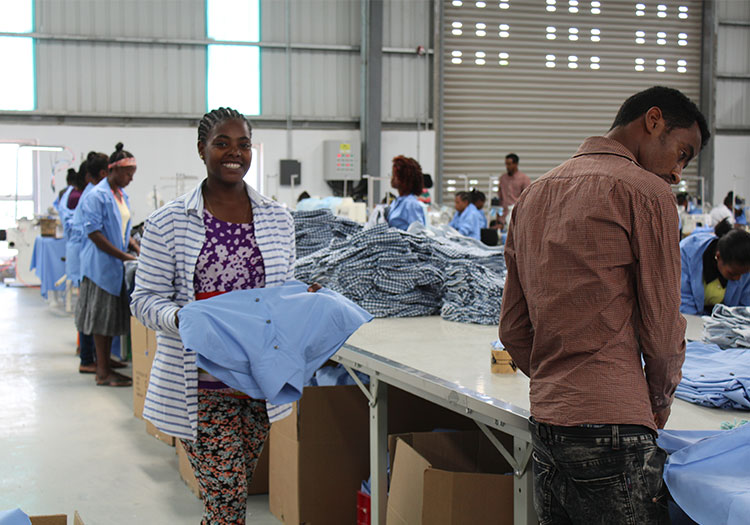Over the last few years, there have been renewed efforts by many African countries to transform their economies from being over-reliant on agriculture and raw material exports by instead seeking to become more diversified, value-added, and industrialized.
The primary aim is to get Africa to transform a lot of the raw materials, and agricultural commodities that this continent produces into processed products.
This industrialization drive, which various experts have also advanced, is essential for sustainable economic growth, job creation, and poverty reduction.
China and other developed nations, in the meantime, have expressed willingness to assist the continent in realizing this aspiration. Beijing’s willingness is, however, demonstrated through various tangible projects that the East Asian nation has proposed. China to her credit has provided a platform for structured engagement with Africa. Programs such as the Belt and Road Initiative (BRI), the Forum on China-Africa Cooperation (FOCAC) as well as the Global Development Initiative (GDI), amongst others, easily come to mind.
There is also the China-Africa Cooperation Vision 2035, in which Beijing has undertaken to help Africa develop “Made in Africa” brands. The assistance, most importantly, includes efforts to integrate the continent into global industrial and supply chains by aiding African countries to develop and revamp their manufacturing sectors. These mechanisms and commitments represent a concrete plan by China to transform the fortunes of countries in the Global South.
For the last ten years, the world has interacted with the Belt and Road Initiative (BRI). During this period, the program has, among other things, demonstrated huge potential to influence and drive participating countries’ industrialization aspirations. The program principally gave great focus on building and upgrading infrastructure, including roads, railways, ports, and energy facilities.
The improved infrastructures have enhanced connectivity that have in turn reduced transportation costs and increased ease of moving goods, making it more attractive for businesses to set up or expand industrial operations among participating countries.
In Africa’s perspective, BRI is, therefore, critical especially considering the push to operationalize the Africa Continental Free Trade Agreement (AfCFTA), which is projected to facilitate countries to realize tariff-free trade.
BRI helps the industrial supply chains remain open by improving connectivity between countries and regions and reducing known logistical challenges. By so doing, industries are able to source and access much-needed raw materials, components, and goods, not just efficiently but also in a more cost-effective way.
Improved transportation and connectivity can boost trade, allowing industries in participating countries to access larger markets. This can lead to economies of scale, increased production, and greater industrialization.
Besides connectivity, Chinese technologies are also facilitating manufacturing in the continent. Through this investment, companies from these countries build up the sector, support the skills improvement of local workers, and contribute to the development of African industries through their linkages.
China is helping to train local youth through various programs, to both help them get jobs and in a broader sense support Africa’s industrialization. China has helped train Africa’s vast youth population and initiated programs, including vocational schools popular as Luban workshops, in many African countries. A number of such workshops have been established in countries such as Kenya, South Africa, Djibouti, Ethiopia, and Uganda, just to name a few.
In Kenya, more Chinese-backed vocational training centers are collaborating with technical institutions and universities such as Machakos, Meru, and Taita Taveta universities and this has seen Luban workshops established therein. With their impact, more institutions of higher learning are signing MoUs with China to establish these workshops.
Some of the courses being offered in these centers, made popular in China’s port city of Tianjin, include automotive engineering, maintenance for new energy vehicles, industrial robotics and automation technology, petroleum engineering as well as urban thermal-energy planning among other subjects that drive industries. These workshops have boosted training in Kenya’s Technical and Vocational Education and Training (TVET) colleges and promise to shore up the abilities and know-how of the local workforce. Long neglected, the government of Kenya has over the last couple of years given much focus to the promotion of these institutions with the establishment of TVET in each of the 2010 constituencies.
Moreover, the Belt and Road Initiative, as proposed by Chinese leader Xi Jinping, has seen some projects initiated as a result of creating special economic zones (SEZs) or industrial parks. Chinese companies are also contributing to the creation of industrial zones in several African countries. The Chinese-contracted industrial parks are vital elements of the infrastructure supporting the structural transformation of Africa.
China has funded and helped set up these parks in countries like South Africa, for instance. Data from the Chinese Ministry of Commerce shows the number had reached 25, attracting over 600 companies. The industrial parks had in turn hired over 40,000 local employees.
The industrial parks established with the support of the Chinese government are also being used by firms of other countries like in the case of Zambia where the Chinese-built industrial park hosts companies from countries such as South Korea and the United States.
In Ethiopia, Industrial Parks such as the one in Hawassa are attracting high-tech manufacturing companies in the textile and apparel sector.
Uganda also has an industrial park in Mbale that was inaugurated on March 9, 2018 courtesy of Chinese support.
The C&H Garments Ltd, a Chinese-invested enterprise producing African-themed clothes as well as uniforms for Rwanda’s forces, has employed some 1,500 local people so far.
Sunshine Industrial Company, based in Dar es Salaam, is one of the biggest investors in Tanzania’s mining and manufacturing sectors.
These zones, as expected, offer incentives such as tax breaks, simplified regulations, and access to necessary infrastructure thereby attracting foreign and domestic investment in manufacturing and industrial activities.
Over and above this, industrialization and energy go hand in hand. The energy sector plays an important role in the economy, both in terms of employment and industrial output. Therefore, the fact that a majority of BRI projects involve the development and expansion of the energy infrastructure, such as power plants and pipelines, setting up of industries becomes a realistic aspiration. And that’s not all, given that continued and targeted investments in the sector will guarantee a stable and reliable energy supply which is fundamental for industrialization. This in turn lowers production costs and supports manufacturing processes.
What’s more, manufacturers rely on a consistent energy supply to maintain continuous production processes. Any interruption in power supply can lead to downtime, resulting in production delays and increased costs. A stable energy supply ensures that factories can operate consistently. Steel, cement, sugar, tea, and wood factories, just to name a few, in Kenya and neighboring countries like Uganda and Tanzania bear testimony.
This reliable energy enables efficiency, reduces waste, lowers costs, and supports the implementation of advanced technologies, ultimately enhancing the competitiveness of local manufacturers in the global market.
It is also not lost that China has demonstrated goodwill and indicated willingness to prioritize industrialization of the continent through the implementation of such measures as investing USD 10 billion in Africa and providing credit facilities of USD 10 billion to support small and medium-sized enterprises and other relevant action plans.
Industrialization supported by the BRI can contribute to overall economic growth in Africa, leading to increased income levels and improved living standards.
Eric Biegon is a Multimedia Journalist at Kenya Broadcasting Corporation.





